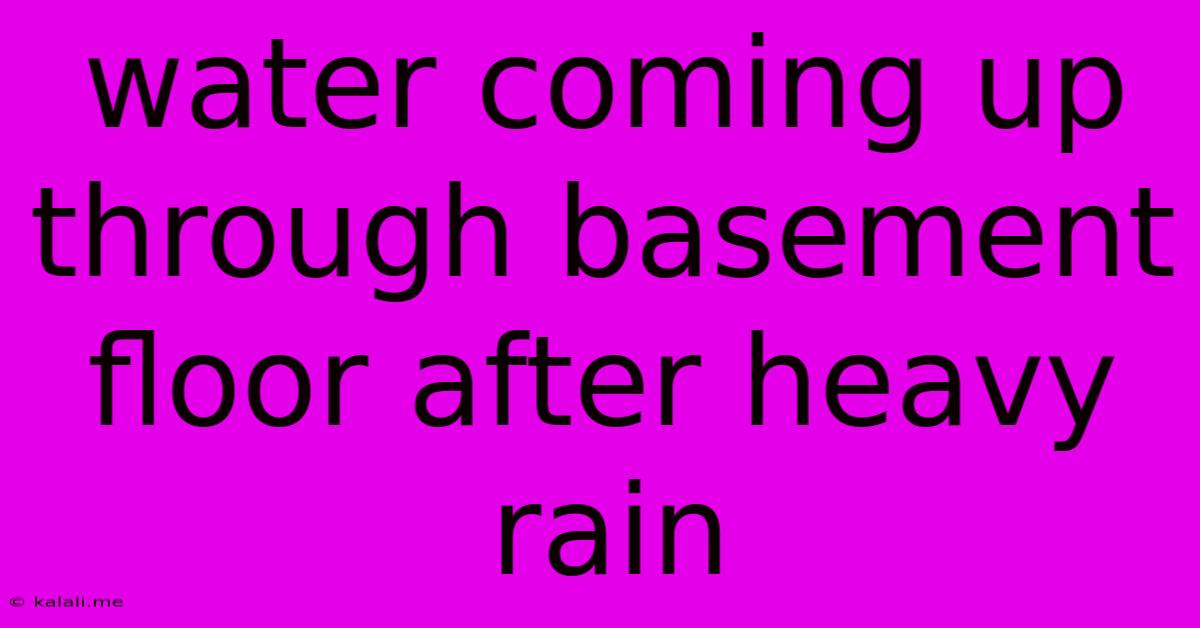Water Coming Up Through Basement Floor After Heavy Rain
Kalali
Jun 08, 2025 · 4 min read

Table of Contents
Water Coming Up Through Basement Floor After Heavy Rain: Causes and Solutions
Meta Description: Dealing with water seeping into your basement after heavy rain? This comprehensive guide explores common causes like poor drainage, cracks in the foundation, and hydrostatic pressure, offering practical solutions for a dry basement.
Heavy rain can wreak havoc on your home, and a flooded basement is a common and unwelcome consequence. Seeing water bubbling up through your basement floor is particularly alarming, indicating a more serious underlying issue than simple surface water infiltration. This article explores the common causes of this problem and provides effective solutions to keep your basement dry and protect your property.
Understanding the Problem: Why is Water Coming Up Through My Basement Floor?
Water intrusion through the basement floor isn't just unsightly; it can lead to mold growth, structural damage, and costly repairs. The culprit is usually a combination of factors, but understanding the root cause is crucial for a lasting fix. Here are some key reasons why you're experiencing this frustrating problem:
-
Hydrostatic Pressure: This is often the primary culprit. Hydrostatic pressure occurs when groundwater builds up against your foundation walls and floor, exceeding the capacity of the surrounding soil and concrete to resist it. Heavy rain saturates the ground, increasing this pressure and forcing water through any cracks or weaknesses in your basement floor.
-
Cracks in the Foundation: Even hairline cracks in your basement floor can provide pathways for water to seep through. These cracks can be caused by settling, shifting soil, or even the freeze-thaw cycle. Larger cracks represent a more significant problem.
-
Poor Drainage: Inadequate grading around your home allows water to pool near the foundation, increasing the pressure against your basement walls and floor. Clogged gutters and downspouts exacerbate this issue, directing water towards the foundation instead of away from it.
-
Broken or Missing Waterproofing: Many basements have a layer of waterproofing applied during construction. If this waterproofing is damaged, deteriorated, or simply never installed correctly, water will easily penetrate the floor.
-
Foundation Leaks: Water may be entering from cracks or gaps in the foundation walls before migrating to the floor. This can happen even if the flooring appears relatively sound.
Effective Solutions for a Dry Basement
Addressing water intrusion requires a multi-pronged approach. Here are some effective strategies to prevent future water problems and fix existing ones:
-
Improve Exterior Drainage: Ensure your gutters and downspouts are clean and functioning correctly. Direct water away from your foundation using extensions or diverting it to a designated drainage area. Proper grading around the foundation, sloping away from the house, is essential. Consider installing a French drain to collect and redirect surface water.
-
Repair Cracks in the Foundation: Small cracks can be repaired with epoxy injection or hydraulic cement. Larger cracks may require more extensive repairs by a qualified contractor. This often involves excavating around the foundation to access and repair the cracks from the outside.
-
Interior Waterproofing: If the problem persists despite exterior improvements, consider interior waterproofing techniques. This could involve applying a waterproof coating to the basement floor, installing a sump pump to remove accumulated water, or implementing a drainage system within the basement itself.
-
Exterior Waterproofing: This involves applying a waterproof membrane to the exterior of the foundation walls, often combined with a drainage system to redirect groundwater away from the foundation. This is a more significant undertaking but is highly effective in preventing future water problems.
-
Professional Inspection: If the problem is severe or persists after attempting some DIY solutions, it's crucial to consult a qualified foundation repair specialist or waterproofing contractor. They can accurately diagnose the cause of the water intrusion and recommend the most effective and lasting solution.
Prevention is Key: Maintaining a Dry Basement
Regular maintenance is vital to prevent future water issues in your basement. This includes:
- Annual Inspections: Inspect your foundation, gutters, and downspouts for cracks, clogs, or damage.
- Regular Cleaning: Keep gutters and downspouts clear of debris.
- Landscaping Maintenance: Maintain proper grading around your foundation and ensure vegetation isn't blocking drainage.
Dealing with water in your basement is a serious matter. By understanding the causes and implementing appropriate solutions, you can protect your home and ensure a dry, comfortable basement for years to come. Remember, preventative measures are key to avoiding costly repairs and ensuring the longevity of your property.
Latest Posts
Latest Posts
-
Verses That Show That There Is Little Time Left
Jun 09, 2025
-
Integration By Parts Choosing U And Dv
Jun 09, 2025
-
Pathfinder Duel Wield Dagger And Pistor
Jun 09, 2025
-
Negative Binomial Distribution Vs Binomial Distribution
Jun 09, 2025
-
Does Searing Outside Of Steak Kill Bacteria
Jun 09, 2025
Related Post
Thank you for visiting our website which covers about Water Coming Up Through Basement Floor After Heavy Rain . We hope the information provided has been useful to you. Feel free to contact us if you have any questions or need further assistance. See you next time and don't miss to bookmark.